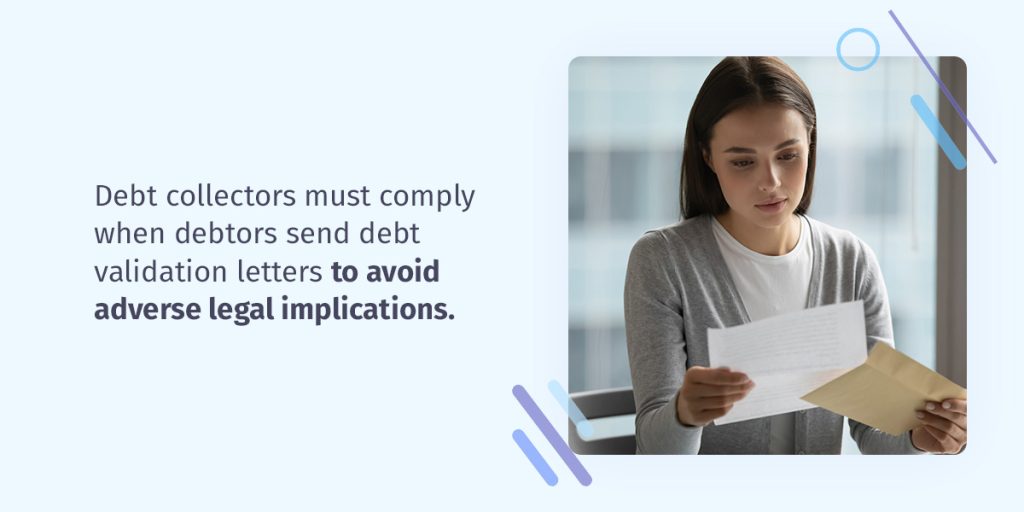- New Customer Inquiries (866) 551-4684
- Customer Service (214) 387-8068
- Make A Payment (866) 558-3328
- Client Portal
- Consumer Support

Georgia debt collection laws protect the interests of debtors and creditors. Understanding the intricacies of debt collection laws can reduce legal risks and compliance issues. Learn more about the state’s debt collection laws and why partnering with the right debt recovery agency can help you meet your goals.
Georgia’s primary debt collection law is the Federal Debt Collection Practices Act (FDCPA), enacted in 1978 to prevent deceptive, abusive and unfair debt collection practices. The law outlines limitations for debt collectors and provides guidelines to protect consumers.
The FDCPA only applies to third-party debt collectors, collection agencies, debt buyers and debt recovery attorneys. It does not extend to creditors. The law also covers consumer debts, including those incurred by individuals, families and households. It excludes corporate or business debts.
Other consumer protection laws, such as the Fair Business Practices Act, protect consumers against deceptive practices. The Georgia statute of limitations regarding debt collection is another essential legislation, highlighting the duration for which a creditor may institute civil proceedings against debtors to obtain what they are legally owed.
Debt collectors are individuals or companies that regularly collect or attempt to collect debt for another individual or business. Under the FDCPA, a debt collector can also be a business that uses another name other than its own to collect consumer debts that belong to it. For example, the following institutions may not be classified as debt collectors subject to the provisions of the FDCPA:
Debtors perform several crucial functions, such as:
Georgia debt collection laws provide debtors with many rights, including:
The FDCPA prohibits debt collectors from adopting abusive, deceptive and unfair debt collection practices. Examples of these types of practices include:

Debt collection letters enable debtors to ask collection agencies to provide information concerning their basis for claiming that the debtor owes a debt. It also allows debtors to ask collection agencies to stop contracting them or their families. Debt collectors must comply when debtors send debt validation letters to avoid adverse legal implications.
Wage garnishment is a powerful tool available to creditors and debt collectors who seek to recover debt in Georgia. But what is wage garnishment, and how does it work?
Wage garnishment is a court-ordered process that allows debt collectors to take money directly out of the debtor’s paycheck to satisfy a debt. In Georgia, debt collectors can garnish up to 25% of the debtor’s weekly disposable income or 30 times the minimum federal wage, whichever is less. If the debtor’s disposable income is less than 30 times the minimum wage, the debt collectors cannot garnish the wage.
Besides wage garnishment, debt collections in Georgia can occur through the following means:
After obtaining judgment, the creditor or debt collector may obtain further orders to garnish the debtor’s bank accounts. However, certain accounts or incomes are exempted, such as pension benefits, unemployment benefits, ERISA-qualified retirement accounts, disability insurance and child support.
Creditors or debt collectors can seek court orders to place a lien on the debtor’s real or personal property — a property lien is a legal claim over another’s assets. Real property includes land and its permanent structures like buildings. Personal properties include movable items like vehicles, appliances and furniture.
In the case of secured debts, debt collectors can repossess properties purchased with the loan. Depending on the facts, the debt collector could sell the assets to cover parts or the whole debt. If the debt collector sells the assets beyond the loan amount, they must account for the surplus funds.
Generally, under Georgia’s debt collection statute of limitations, if the loan agreement was a written contract, the debt collector must file the lawsuit within six years from the date the debt was due or payable. If the loan agreement was oral, the lawsuit must commence within four years from the default date instead of when the debt was due.
If the time passes, the loan becomes statute-barred. The legal implication is that the debt collector or creditor may lose their right to institute legal action. Technically, the loan remains unpaid, but the creditor may not seek legal remedies in court. Debt collectors may try using non-judicial means to collect the debt, but the debtor is not legally obliged to comply if the statute of limitations for the claim has passed.
Partnering with trusted debt collection agencies like Southwest Recovery Services, LLC, has many benefits. When you work with us, you get access to these advantages:
Southwest Recovery Services, LLC, is a reputable financial services and BPO organization. We have multiple offices across the country, including a location in Snellville, and are ready to assist with your debt recovery needs. We don’t get paid unless you do, so there is no risk.
At SWRS, we are ethical and compassionate yet effective in our collection efforts. Do you want to learn more about outsourcing debt recovery? Contact us today!


We make it fast and easy to refer past due and delinquent accounts to our professional recovery agents. You decide the range on what you will accept on each case, and you ONLY pay a percentage of what we actually collect to resolve the case. Ready to get started, or want to learn more? Fill out this form and a dedicate account manager will call you to get started.